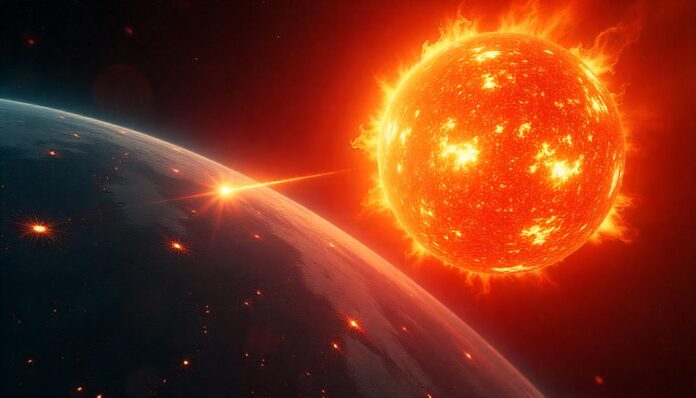
If the sun were to explode, it would be catastrophic for our solar system. The sun is the center of our solar system, and it provides us with light and heat, which are essential for life on Earth. Additionally, it is our main gravitational force for all planets in the solar system.
However, our Sun cannot naturally explode as a supernova. This fate awaits only stars at least 10 times more massive than our Sun. Instead, our star will follow a different death process, expanding into a red giant before shrinking to become a white dwarf.
Besides that, our sun is still in the middle of its life cycle, and it’s expected to remain stable for several billion years (7-8 billion to be more specific). And so, for our hypothetical scenario, we need to imagine what would happen if the Sun somehow defied its natural destiny and exploded.
Let’s start.
Immediate Effects
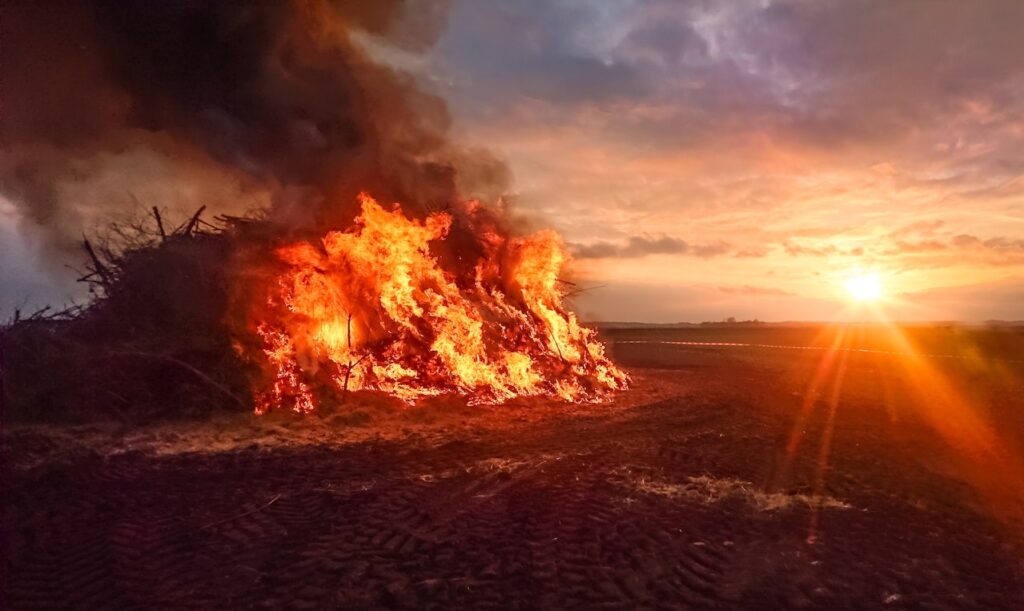
The Eight-Minute Warning
If the Sun were to explode, we wouldn’t know about it for 8 minutes and 20 seconds. This is the time it takes light to travel the 150 million kilometers (93 million miles) from the Sun to Earth.
We wouldn’t hear the explosion because sound cannot travel through the vacuum of space. By the time we saw the flash of the explosion, it would already be too late.
Interesting fact: The Sun's light reaches Earth in 8 minutes, but its gravitational effects would also take 8 minutes to change – meaning Earth would continue orbiting normally for those final 8 minutes.
Deadly Impact
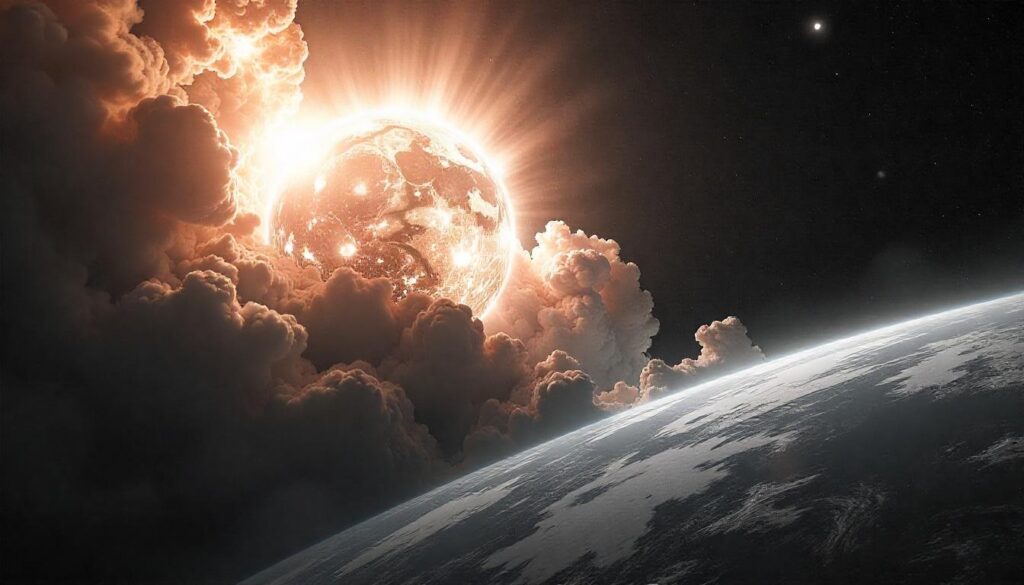
The first deadly impact would come from neutrinos, which travel at nearly the speed of light and carry about 99% of a supernova’s energy. These particles would pass through Earth, causing organisms to “boil inside out” within seconds.
The explosion’s electromagnetic radiation would reach Earth in that same 8-minute timeframe:
- Gamma rays and X-rays would kill all life forms quickly
- The side of Earth facing the Sun would be instantly vaporized
- The shockwave would completely destroy our planet
Interesting fact: A solar flare releases energy equivalent to millions of 100-megaton hydrogen bombs exploding at once, and a full explosion would be millions of times more powerful
Long-Term Effects
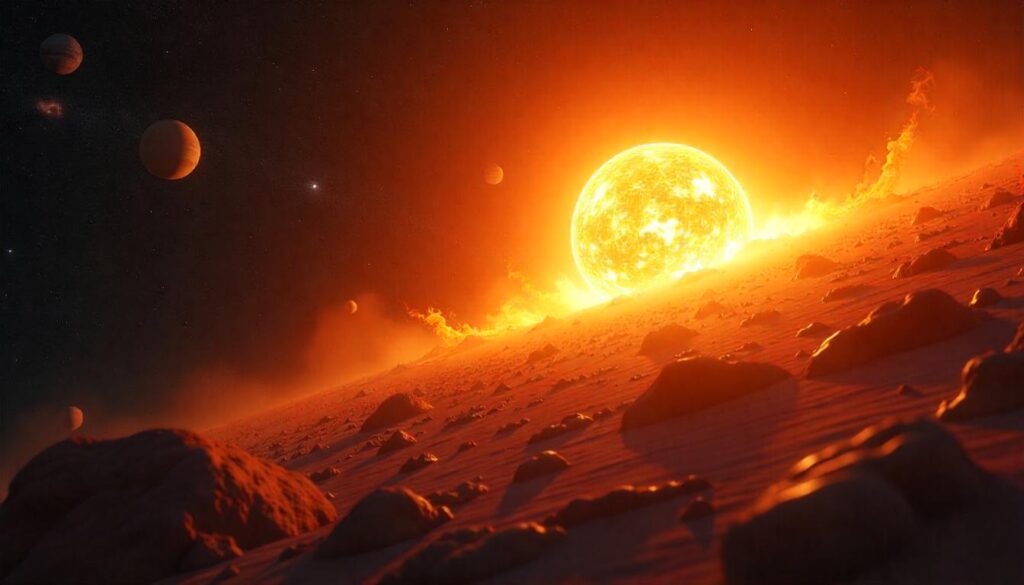
Impact on Earth’s Climate
In this hypothetical scenario if Earth were to survive it would have a completely different climate. If we could even call that climate. The sun’s explosion would release a massive amount of energy in the form of radiation and particles. This energy would travel through space and eventually reach Earth, where it would have a profound effect on the planet’s climate.
Radiation and particles would cause a significant increase in temperature on Earth, leading to a greenhouse effect. This effect would cause the planet’s oceans to evaporate, creating a thick layer of clouds that would trap heat and prevent it from escaping into space. The result would be a planet that is too hot and inhospitable for life as we know it.
Additionally, we know that Sun has a huge impact to gravitational forces around our solar system. Well, without sun, then Earth would be drawn to a new center of gravity. That would trigger our planet (and our satellite and other planets) to start drifting into space.
Impact on the Solar System
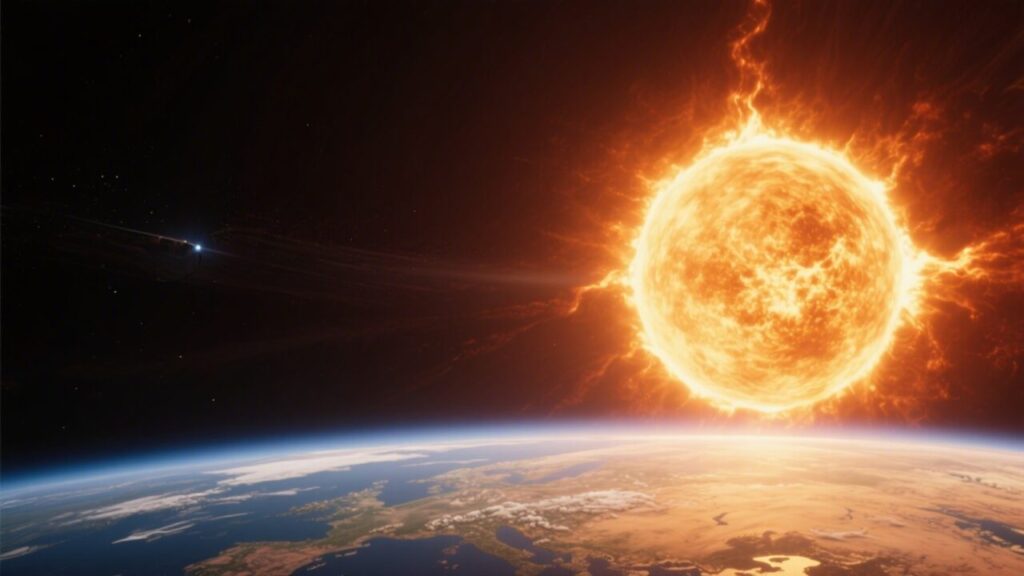
The sun’s explosion would also have a significant impact on the rest of the solar system. The explosion would release a massive amount of energy that would travel through space at the speed of light. This energy would interact with the planets and other objects in the solar system, causing them to be pushed out of their orbits.
The result would be a chaotic and unpredictable for our solar system, with planets and other objects colliding and being flung out into space.
The asteroid belt between Mars and Jupiter, for example, would be completely destroyed, with the individual asteroids either being vaporized or flung out into space.
The explosion would also have a significant impact on the outer planets, such as Jupiter and Saturn. These planets are massive enough to generate their own internal heat, which is why they have a significant number of moons.
However, the explosion of the sun would cause these planets to lose much of their internal heat, making them much colder and less hospitable to any kind of life.
Interesting fact: Scientists have identified actual "rogue planets" wandering through space without a star, and some may have subsurface oceans kept liquid by internal heat
Would Humanity Survive?
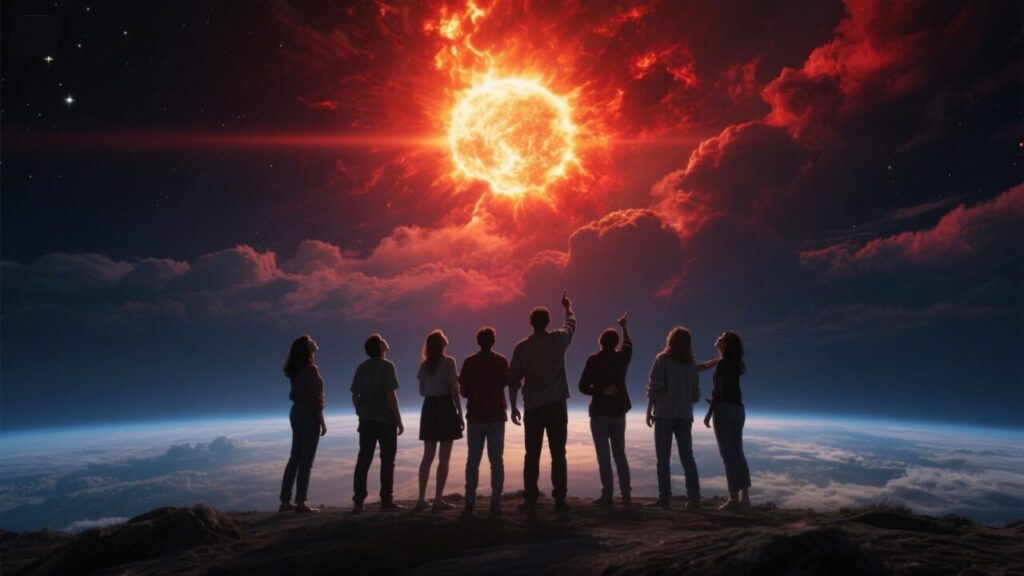
We tackled this topic a bit in previous paragraphs. If sun exploded suddenly and randomly (without us knowing about it and without any preparation) – the short answer is – NO – we would not survive.
Nothing would survive except potentially some bacterial life. However, in theoretical scenario of small explosion and if we knew in advance that the sun would explode, we would have some time to prepare and then perchance prolong our existence on Earth.
Since without the sun we would freeze to death on Earth surface we’d need to think about other potential solutions. One would be to “travel” deep in Earth’s underground. Namely, temperature is higher the further down you go. With enough resources and the proper technologies, humanity might be able to survive without the Sun for a couple of years in underground fortified bunkers.
That is of course, if the planet would not be completely destroyed, and as we concluded previously – it probably would be. Probably not all planets would be destroyed completely.
But those that are the closest ones would be for sure. And Mercury, Venus and Earth are among those planets.
Interesting fact: Extremophile bacteria have been found living 3 kilometers deep in Earth's crust, surviving on radioactive decay rather than sunlight, and might be the last life forms to perish.
Effects on the Oort Cloud and Beyond
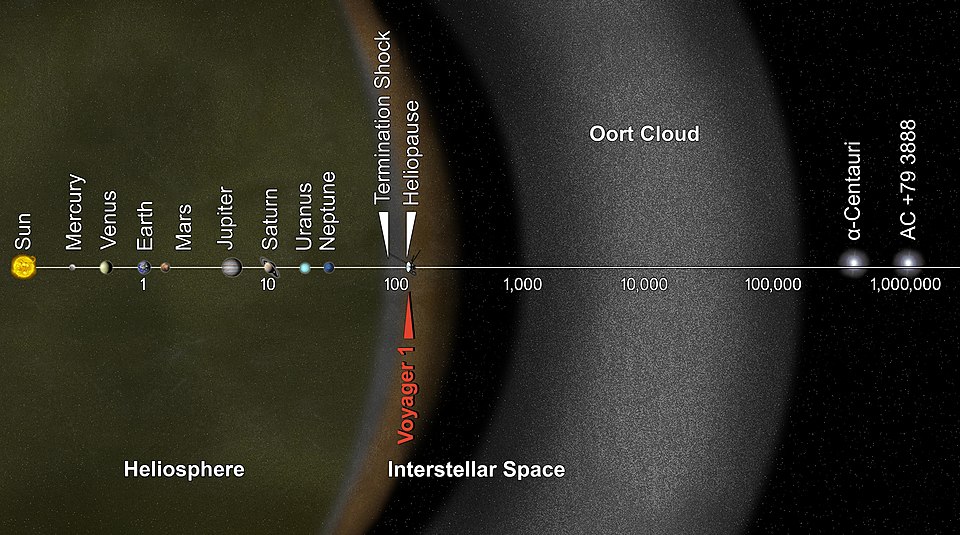
The Sun’s explosion would also send a massive shock wave through the Oort Cloud, a huge shell of icy objects that surrounds our solar system. This region extends from about 2,000 to 100,000 astronomical units from the Sun (one astronomical unit equals the distance from Earth to the Sun).
The explosion would:
- Disrupt the orbits of trillions of comets and icy bodies
- Send many of these objects hurling toward the inner solar system
- Push others out into interstellar space
- Create a spectacular but deadly comet shower visible from nearby star systems
The energy wave would continue to spread through interstellar space, gradually weakening but still detectable by alien civilizations with the right technology.
Interesting fact: The Oort Cloud may contain trillions of objects larger than 1 kilometer (0.6 miles) in diameter, yet its total mass is estimated to be only 3-5 Earth masses spread over a volume billions of times larger than the inner solar system.
Theoretical Artificial Triggers
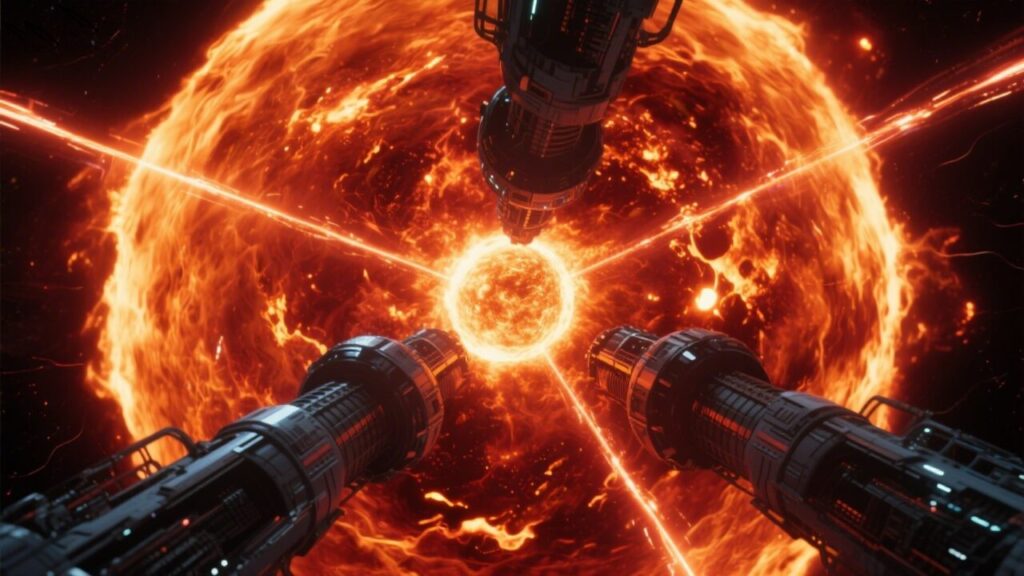
While our Sun cannot naturally explode as a supernova, some theoretical physics has explored whether artificial means could trigger catastrophic solar events:
- The “AB-Criterion” theory suggests that creating higher temperature and density in a limited region of the solar interior could potentially trigger self-supporting thermonuclear reactions
- Such an event would require technology far beyond our current capabilities
- Any civilization with such technology would likely understand the consequences and avoid such actions
- The energy required to artificially trigger a solar explosion would be so vast that it might be more efficient to harness the Sun’s energy through other means
This remains purely theoretical and belongs more to science fiction than current scientific possibility.
Interesting fact: The Sun already undergoes nuclear fusion at its core, converting 600 million tons of hydrogen into helium every second, releasing energy equivalent to 91 billion megatons of TNT per second.
Conclusion
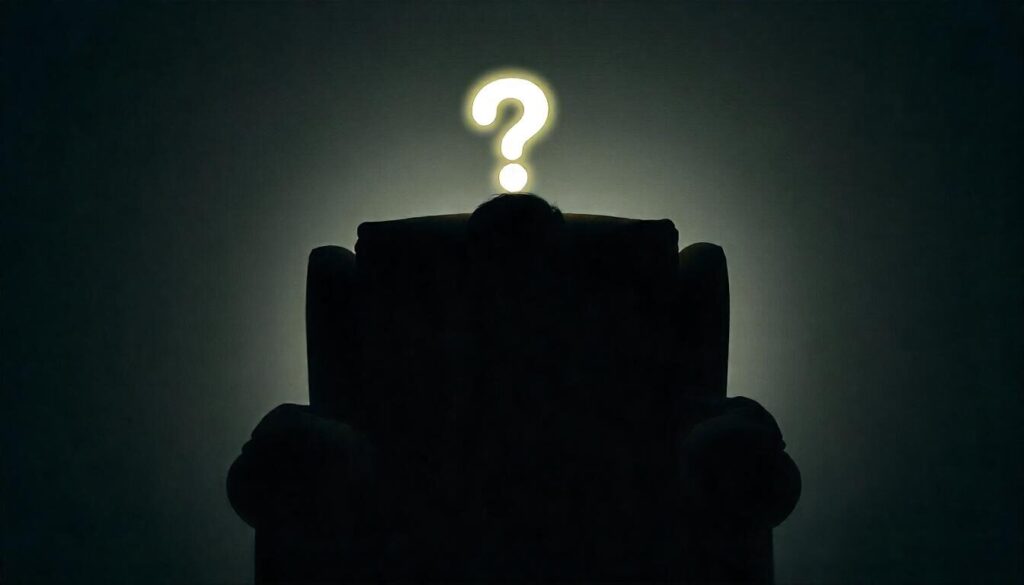
The Sun’s hypothetical explosion presents one of the most catastrophic scenarios imaginable for life on Earth. The event would unfold with terrifying speed-within minutes, all life on our planet would end. The inner planets would be destroyed, while the outer planets might survive but be forever altered.
This scenario, while fascinating to explore, remains completely in the realm of science fiction. Our Sun lacks the mass to explode as a supernova and will instead follow a more gradual end-of-life process billions of years from now.
The study of stellar explosions helps us understand our cosmic origins and the processes that created the elements essential for life. Every atom of carbon, nitrogen, oxygen, and heavier elements in our bodies came from stars that lived and died before our Sun formed.
And so, our existence certainly represents an interesting moment in cosmic time. We are made of star-stuff, temporarily assembled into beings capable of contemplating the very stars that made us possible.
While a solar explosion would end Earth’s story, the elements of life would continue their journey through the cosmos, perhaps one day forming new worlds and new possibilities for life.



























